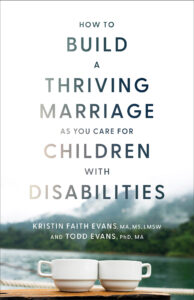5 Coping Skills You’ll Need for the Hard Days as a Parent of a Disabled Child
Managing stress during the hard days takes a bit of intention and skill. If you’re the parent of a disabled child, this may encourage you.

It’s an established fact backed by mounds of research: couples parenting children with chronic illnesses or disabilities experience significantly higher levels of everyday stress than couples parenting children without special needs. What’s more, one of the greatest predictors of marital satisfaction for caregiving parents is our stress levels.
There are two generally accepted approaches to managing stress: either eliminate or reduce the cause of the stress or learn more effective ways of coping with the stress. You likely cannot change your situation or many of your stressors right now, but by learning and applying new emotion and stress regulation skills, you can help your marriage thrive as well as better balance your emotions and lower your body’s stress responses.
The research shows there are specific coping strategies that make caregiving marriages more resilient. These are also the skills we’ve discovered and developed to help strengthen our own marriage!
1. Find Strength in Faith
“Those who hope in the Lord will renew their strength” (Isa. 40:31).
Leaning on God’s power and endless love saved our marriage. We discovered how depending on faith amid incredible stress and grief can bring renewed hope and joy. Our experience of finding new strength in our marriage through our shared faith is not unique. Studies have shown that sharing a healthy relationship with God and strong faith practices such as praying, reading Scripture, and attending church can help you cope more effectively.
2. Live Mindfully
“The Spirit of God has made me; the breath of the Almighty gives me life” (Job 33:4). Regardless of your current life circumstances, look around at where you are and take one moment at a time. Worrying about the future fuels anxiety and raises stress levels. Similarly, when you keep turning around to relive the past, guilt and depression can follow you. Yes, the two of you have to plan ahead and honor the past. But once you’ve taken time to reflect and your plans are in place, notice your current surroundings and feel yourselves in your present day.
You can practice being mindful by:
Consciously observing what’s going on inside you and around you.
Remaining nonjudgmental about what’s happening, what’s being said, and what you’re thinking and feeling.
3. Destress Together
“He lets me rest in green meadows; he leads me beside peaceful streams. He renews my strength”(Ps. 23:2–3 NLT).
Finding ways to destress and relax together is essential. When you relax together, you are coping together, which will strengthen your relationship. Here are some other ideas for how to soothe one another’s muscles, minds, and emotions:
Go for a walk or jog together.
Lie on a heating pad or under a heated blanket together.
Drink hot tea while snuggling in a blanket together.
4. Support One Another’s Self-Care
“Therefore encourage one another and build each other up, just as in fact you are doing” (1 Thess. 5:11).
By supporting one another in caring for your individual mental, emotional, spiritual, social, and physical health, you will both be better able to manage stress and have improved mental health.
Here are a few ways you can support each other’s self-care:
Encourage your spouse to go for a walk or jog.
Make them a fruit smoothie.
Arrange a day or a couple of hours to give them a break.
5. Laugh Together
“Being cheerful keeps you healthy. It is slow death to be gloomy all the time” (Prov. 17:22 GNT). A few years ago, we went into our daughter’s room to wake her up from her nap. Boy, did we find a surprise! As we opened the door, a pungent wave overwhelmed our noses. Horror music played in our heads as we stared at the plastic panels enclosing her medical bed. She had fingerpainted every vinyl window, and not with watercolors. She had also given herself a special makeover.
We turned to look at one another, a mutual understanding of emotional pain in our eyes. We both wanted to sink down to the floor and cry. But instead, we did something different. We began to laugh so hard our stomachs hurt and tears rolled down our cheeks. Why did we laugh? We honestly can’t remember who said what first, but it was something like, “Wow, she’s quite the artist! Looks like she had fun.” Or, “Her bed needed a good disinfecting anyway. You wanna bet how many wipes it’s going to take?”
By allowing ourselves to even just briefly and silently acknowledge our painful thoughts and emotions, we were able to feel positive emotions. The experience drew us closer rather than driving us apart.
Reflection:
- What coping skills are you using in your life, marriage, and parenting to deal with the hard days?
- What new coping skills are you going to start implementing to deal better with your unique stressors in life?
Learn more about creating a strong, stable, and thriving marriage as a parent of a child with disabilities in Kristin Faith Evans and Todd Evans’ new book, How to Build a Thriving Marriage as You Care for Children with Disabilities as they walk you through the practical steps they took to save their own marriage.

Kristin Faith Evans, MA, MS, LMSW, and Todd Evans, PhD, MA, are award-winning authors, speakers, and disability parents. They earned their MA in Christian educational ministries at Wheaton College in Illinois and have served together in full-time ministry in church, camping, and retreat settings. Todd received his PhD from Vanderbilt University’s School of Engineering and currently manages his own business. Kristin earned her MSW from the University of Tennessee and is a Licensed Master Social Worker experienced in couples, child and family, substance abuse, and crisis counseling. Connect with them online at DisabilityParenting.com.

100 Words of Affirmation Your Son/Daughter Needs to Hear
Matt and Lisa Jacobson want you to discover the powerful ways you can build your children up in love with the beautiful words you choose to say every day–words that every son and daughter needs to hear.
These affirmation books offer you one hundred phrases to say to your son or daughter – along with short, personal stories and examples – that deeply encourage, affirm, and inspire.
So start speaking a kind and beautiful word into their lives daily and watch your children–and your relationship with them–transform before your eyes.







